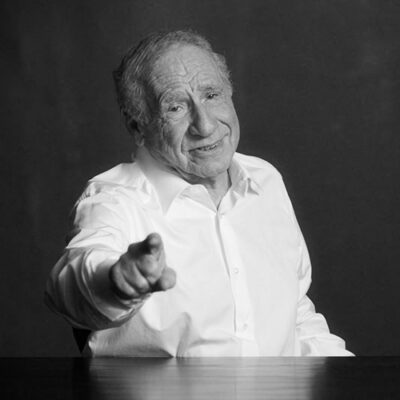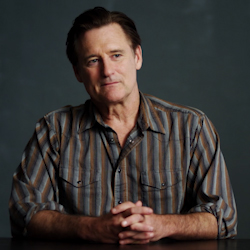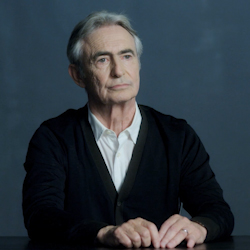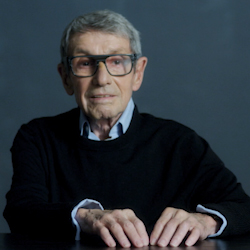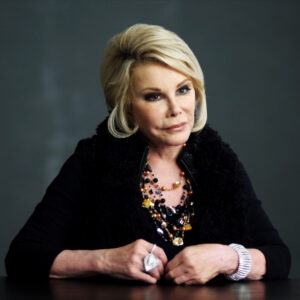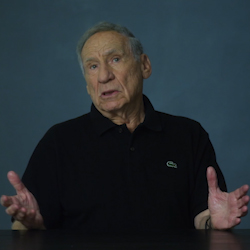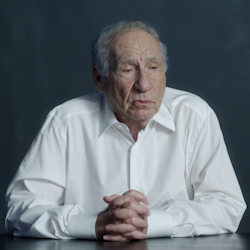Interviewer: Here we go.
Richard Lewis: All right, good.
Interviewer: So tell us the tell me the story about being in the hospital.
Richard Lewis: First of all, don’t ask me to go. I don’t know. I, I really. I do. I do know impressions. You’re gonna have a thousand people. Do I. In my mind. Mel Brooks, I sound like you know Sophie Tucker. Don’t ask me. I beg of you, don’t humiliate myself. And then Mel, call me. That wasn’t me. Who are you? How dare you? I don’t want to. I don’t want to get his wrath. Hilarious. Well, sometimes it’s Rahaf, man. Let’s be honest. OK, let’s say I’m doing I’m a virgin. I’m a virgin. I’m 14. I get a call, a mysterious call from my best friend, John Dembrow. He says you’ve got to come over the house by midnight tonight. You know, I wasn’t an alcoholic yet. I’m a recovering alcoholic. But then I wasn’t. And I knew that wasn’t about women. It wasn’t a drug deal. Something was up. You’ve got to come, all right. All right, I’ll sneak out. I snuck out of the house. You let me in and he says, listen to this. That was 2000 year old man. And I was mesmerized. I went, oh, my God. How can anything be this funny? Who is this man? I thought it was the Messiah. You know, I mean, of course. I love Karl, but it was you know, it’s it was to them. It was them. And it was like finding the Holy Grail. You know, I mean, I had loved television sitcoms, Bilko and Gleason and others, but I had never heard of a brain twist words so articulately and in such a fashion as I did. And I was so hooked. It was like it was like, you know, it was like getting a shot of comedic heroine, really, as a I mean, it was like. It was like one. It was it. It transformed me that moment. And, you know, and, you know, I can close my eyes. And I remember my friend saying this, but here what just kind of man, he made it so mysterious because he was like freaked out by it because he couldn’t believe it. And the next time that happened to me was when I heard my first Lenny Bruce album in college. You know, these you know, these days is a lot of people and ah, Jonathan, winners. You know, there’s a lot a lot of people like that, you know, that started. You know, you’ve got to give credit to people that I mean, there are a lot of wonderful, great humorous. But those who come first have to get most credit, just have to because, you know, even though there’s a lot of people that come from the same tree, I mean, with all due respect, Oscar Levant, Woody Allen myself, Larry David, Jewish Mothers, Brooklyn Narada. Great. You know you know that we’ll have we’ll think of subjects that when we’ll be close on premises and even punchlines lines. But there are but those who come first get should get the most credit. And and there is there’s only one Mel Brooks and he. And no one can ever be as authentic as him doing his kind of stuff. I mean, it’s the kind of thing with Mel when you. I mean, and not just and it’s not just that album and the other albums and his movies, but his style is so authentic and so him that it’s embarrassing if anyone even comes close to China ripping them off because you’re nuts. You know, it’s Mel. That’s Mel. Know it’s not. And Mel is through. Mel would say God is three letters. Mel is Mel. Mel would would do would probably like that. Like the fact that Mel has three letters like God, because he is a kind of God to me.
Interviewer: You raise an interesting point, though, when you’d say the thing about The Honeymooners and took on all that. So what you’re so talking about and I mentioned to him the other day. It’s the same tree. And it’s Brooklyn and it’s Jewish and it’s mother’s on this.
Richard Lewis: Well, not Gleason, but of many.
Interviewer: But but Gleason with The Honeymooners.
Richard Lewis: Oh yeah.
Interviewer: I rooted rooted in situational comedy. But Mel’s not.
Richard Lewis: No, it’s not. Mel, Mel is.
Interviewer: Ready. You were saying about that.
Richard Lewis: Well, you know, I mean, first, I mean, you got to I mean, there’s so many, you know, you’re going to deal with his career. So it’s not for me to say except, you know, his records and his films and his personality onstage offstage are very are so unique. And one of the things I I love about comedians and all tours, like Mel said it for me at least, and in my relationship with them movie, we’re not the tightest of friends. But I’ve been around him for decades and I was lucky enough to be one of his films is that he’s pretty much the same guy on and off stage. You know, it’s not like, you know, he’s you know, he’s him. It’s just him. And on and so there’s nothing phony about his genius. He’s just a genius as far as I’m concerned. And the reason I consider him a genius is because no one can articulate phrases. Like him. Nobody can take us to have a spin on a subject matter like him. Nobody can. I mean, like him. I mean, Pryor can do his thing. Lenny can do his thing. Jonathan wins. Could do his thing. Nichols and May. And on and on. But Shelley Berman. And they have and they’re geniuses in their own right. But Mel is so unlike these others, these are the pillars of comedy. And it’s amazing. And, you know, you know, I get a little you get a little weirded out sometimes because Mel is so Jewish. Okay. And yet I know so many. There’s not that many Jews in America. OK? And there’s a lot of people that love Mel Brooks, so you don’t have to. You know, I have herring on your breath. You know that this guy is amazing, you know? So, you know, I mean, it it it’s it’s if you’re Jewish, you might have a maybe a deeper laugh or have, you know, more of an understanding of a joke, maybe, but not necessarily because, you know, he maybe he’s so he knows what comedy is. He knows what a joke is and he knows what a premises. So, you know, you know, you can be any race, color, creed and still find him thinking that the be the funniest around, you know. And many people do. Millions.
Interviewer: It’s just interesting was at a time when a lot of Jewish comedians were sort of trying to. This may not be the right fit phrase, but assimilate their act. He was out there with. You know, he wasn’t trying to water it down. There’s no watering down.
Richard Lewis: No, no. Mel Brooks is clearly, you know, it’s hard to define genius. OK. So, you know, if you hear a riff and if you take any of the any of the routines on the albums, for example, or or great scenes from some of some of his great scenes, from some of his films. It’s you know, it’s they they speak for themselves. So, you know, and far be it from me, I’m not like, you know, lecturing here, you know, or, you know, at college. But it’s it’s something that is so special and so unique to him. And the end, if it really connects with millions of people, then, you know, something is really special. And he has he has connected with Milk World worldwide, you know. And so there’s a there’s something going on there that’s very special between him and the rest of the world. You know. You know that that make him. That makes him Mel Brooks. I mean, when people love Mel Brooks, they love him because he’s fearless and they love him because, you know, he he takes no prisoners with his comedy. He does it his way, you know, and he’s just the. He doesn’t he doesn’t really care to water down anything he does, he goes right for the jugular, you know, and and when he does it, he does it his way better than anybody. And as authentically as anybody.
Interviewer: But it’s always there’s always a it’s always based on always has a what would you call it, a vaudeville or a borscht belt. It’s always grounded.
Richard Lewis: Yeah. Well, you know, I don’t know. I mean I mean, I we I know how I know is his beginnings and, you know, in vaudeville and poison pill and having to make people laugh in the Catskills, which is murderously difficult. But he was a wild man. I mean, no. Yes. Sid. About how he was up in the room. In the writers room. He was out of it. You know, he was it’s he was crazy, crazy, funny, crazy, brilliant. He was like he was like a monkey on a Duracell battery running around and. Yeah. Listen. Of course, he was he’s tremendously Jewish. He’s like, you know, gargantuan lead, gargantuan. And, you know, it’s ah. Of adver gargantuan. You and I can’t even pronounce it. What’s that. Help me.
Interviewer: Gargantuan, Lee.
Richard Lewis: Gargantuan. You know, let’s edit that out because my wife would destroy me if this is on American Mazur’s now. I’m an idiot. I’m an idiot. He’s phenomenally Jewish. Okay. Which is. And I’m proud of that. I was I would I pop that a Jew. So I, I all of a sudden I hear this Jew who is the funniest Jew I’ve ever heard in my entire life. So that’s a good thing. You know, if I popped out Chinese and it was, you know, Mel Chow. I’d be thrilled, you know. But he’s no Brooks. And he was the funniest Jewish person that ever lived. And the thing that’s so amazing, too, is that a lot of his phrases to me. One one thing that I love in particular, his phrases from the albums. Live in people’s consciousness, you know, throughout their daily lives. So what? You know, you could be anywhere and all of a sudden you’ll be with somebody who, you know, knows a lot about Mel and you’ll go something bigger and better than Mantovani. You’ll kick out things from his albums, you know, in particular or something from a film, a line, you know, like, you know, even, you know, in, you know, oh, God, when he’s in high anxiety, when, you know, when he when is his. And Ralph, who was his butler, you know, and I’m blanking on this wonderful comedian’s name who passed away. Irish guys is brilliant. And he and he’s trying to pick up the suitcase.
Interviewer: Guess is it. This is Ronnie Graham.
Richard Lewis: No, it’s not Ronnie Graham.
Interviewer: It’s I have called on it.
Richard Lewis: Yeah. Hi. Yeah, it’s. Give him the scoop. Because I started with. He was already a comedian back at the Improv. He was just brilliantly funny and. Sweetheart, it’s.
Interviewer: Hold on. Here it comes. The character’s name is Brophy.
Richard Lewis: Always a Brophy.
Interviewer: But that was the character’s name. Yeah. Tell who the actor is.
Richard Lewis: It was a stand up comedian as well.
Interviewer: He was white.
Richard Lewis: Oh, yeah, absolutely. He was a really good.
Interviewer: Ron Carey.
Richard Lewis: You’re Ron Carey. All right, Carey.
Interviewer: So start again.
Richard Lewis: Yeah. You know, there yeah. There are times like, you know, I’ll be like at the airport, say, for example, and something we’ll just click because I know I. Mel Brooks, his DNA is part of my life, you know, for knowing everything he’s ever done. Every every no lease on, you know. You know. You know, and on record and in films. And there are certain phrases that stand out more than others. You know, for me. So if I’m at the airport and I’m with a friend or and I’m go and I’m picking up something and I it’s too heavy it I know I shouldn’t I go. I got it. I got I got it. I don’t know. And that’s I’m doing that right out of high anxiety. And then everyone, we all start laughing and this stuff happens all the time. But it happens more with like with Mel Brooks stuff than with any other comedian I know. Other than perhaps. Well, there’s a handful, but none probably Mel, more than anybody, because there’s something about. What he did with his with his one liners, which really weren’t one liners, they were more almost philosophical jokes, and they had such incredible meaning. It wasn’t just like a punch line. It was like it. It was almost biblical. Some of his some of his jokes. And so it really had it really it really stuck to your guts when you heard it. I mean, you screamed out loud, you know, funny, you know, laughing. But, I mean, it also weighed him in. And that was really I mean, even that thing I had mentioned before, like, you know, when when they discovering God for the first time, you know, when I think the line one of the lines is like there’s something bigger and better than Mantovani. I mean, that’s the punch line. But, you know, it’s a it’s a philosophy in a sense, too. And, you know, and it’s so and it’s it’s it’s it’s powerful. It’s powerful to be able to get huge laughs and also say something that you can remember. I mean, look, I’m going to be 65 years old, and I was 40 when I first heard it. And it’s almost like I feel like I’m fifteen right now. Had just heard it when I hear them again and again and again, because I just, you know, it’s it’s it’s like if I stopped hearing Mel Brooks albums or stopped seeing his films, I would feel like I was like part, you know, almost dead because he’s so much a part of my life, you know. So that’s how important it is to me.
Interviewer: The other thing I want to I think we should mention is, again, as you said, the comedy is rooted in literature, history, philosophy, as opposed to my mother in law. The kids, my wife, that my job, you know. Right. So it’s a lot of his.
Richard Lewis: True. It’s almost as if if if you found a joke book. Yeah. Like you have like Milton Berle had the million joke book, you know, a million jokes and Milton Berle’s jokes, his would be a Toora, you know, or B or a scroll. You know, be like Moses coming down and saying I here’s here’s some new material from Mel because it really did incorporate much more than just a setup and a punch line. It had, like you said, had to do with history and literature and philosophy and religion and. And somehow he was able to a life and death. And and he did it in a way, unlike anybody else. And but he also. But he also had this going for me. Had this amazing. He was an easy, an astonishing wordsmith. I mean, I don’t think I don’t think does anyone quite as good as him. I mean, sitting, having dinner with him, a lunch and just listening to him talk and twist a phrase eternal turner, just turn a sentence around. You know that you’re in the presence of a genius because no one else can do that. And his head goes through this in a certain place that no one else can. And that’s you know, that does not necessarily define genius, but it defines something that is beyond special, you know, comedically, you know, and and I something else about him, too. I remember when I was he called me up and when he wants something, you know, you know, he’ll he’ll kill kill you if you don’t do it. I mean, he’ll he’ll come after you. I mean, when he when he knows, you know, I remember I was at home in the early 90s and he says, Richard, now you’re my Prince John. Are you talking about. I have no idea what I’m doing. Robin Hood. And you’re a Prince John. But he did it in a way like it was said. I signed the contract. I called one agent. And, you know, as far as Mel was concerned, I’m in. And then he then I don’t remember, I’m paraphrasing what is basically if I didn’t do it, he’d murder me, basically. So, of course, I would want to work, you know, with Mel, you know, and and I consequently did it. But the thing that I’ll always remember that out of that movie was that the movie before that movie did didn’t do that well. And he was sort of a he seemed cranky to me. And it was very hot. We’re shooting outside with like 100 degrees almost every day. And wearing in costumes was like, incredible, really hot. And if he was I to a cranky mood, I felt obligated because I love the guy so much, I would go and whisper little routines. I said no to me. If it’s hot. Let’s take a break. And why don’t you do do the two thousand do the through the the average baby to the baby. Then I would do I would set him up with Carl Reiner lines and then he was all of a sudden he’d be transformed into doing the album live in front of like 200 people, the crew that and bring the whole place down. All right. Enough, enough for me. It’s guts got back to the movie and he would be in it, would, you know. I don’t want to get too much credit for this, but didn’t happen all the time. But it was so beautiful because I knew that if I would just turn him around a little bit, then he would be in a better mood. And it trickles down from the director, of course. So I would do that a lot. So I was I was almost done with the film, had one scene left. And I will. And Dom Delany’s I really miss Amies. He just destroyed me. He just was great. And he did that Marlon Brando riff and Robin Hood, which is, you know, that scene alone is worth the film to me. He was unbelievably funny in that scene. And I was supposed to be in it, but I only had two lines and it was expositional. I didn’t really have to be there. And as it turned out at the time, I was pursuing Don Rickles for a series when the friend of mine and we and we actually got it going. And I went out to dinner and I got food poisoning. I got hepatitis A and I was hospitalized. I was like or I look like a Jewish sardine. I was like, I had one hundred and six fever. I’m it’s Cedars. And I still had one scene left to do in Robinhood. And I’m in Cedar Sinai. And Mel calls me and I you know, I knew that I was, you know, I thought I was gonna die. I mean, I looked and was I was really serious. So milk cause my room, he says, Richards mouth, look, come on. We love you. I’m doing a bad Mel. Here’s his lesson. Here’s what we’re gonna do. We’re going to pick you up in an ostrich. We’re going to get you right to the set and we’ll get to Lina against a piece of wood. And we’re going to paint you so you don’t look yellow. Phil, do you two lines will carry you right back into the stretch? You’ll be back at Cedars in 20 minutes. I go, Mel, I’m dying. I think I’m dying. I have 106 fever and jaundice. I can’t hang them on. He called me about 15 times with the same riff about, you know, leaning me up again. I said, no, I don’t want to be lean. I don’t want to lean up against a piece of wood and painted white. I’m a Jew sardine now. I’m dying. Let the sheriff of Rockingham do might do. My line was like, are you sure you’re gonna? I mean, they didn’t need me. And it turned out they didn’t need me in the scene. Thankfully, I was done with the film. But I had to get my doctor to call Mel Brooks. And he was nervous and he had a call and says, let my patient alone. He’s not you know, he’s done. He’s wrapped. He can’t do it. And but it was so funny hearing him begging me in his actually was not begging. He was basically saying, you have to come and finish the movie. And the key, you know, he’s a director and, you know, it’s like once you sign on to anything, you know. You know, you’re like a sort of a slave to the production. But in this case, I was smart enough to know, hey, you don’t really need me for this scene, even though I was disappointed not working with Dom. But the guy wouldn’t let me alone. He would not let up for about five or six hours. You know, it wasn’t about my hepatitis. It was about those two lines. And but that’s him. I mean, he’s really he’s like a it’s almost like he’s like a funny mobster, Jewish mobster when he wants to be a no, he’s a killer. I mean, when he wants something, you know, he does and he does it his way. And that’s why he’s one of the greats. And when you when you consider the great comedians, the great show Rise on television shows like I’ve been working with, like my old buddy Larry David. He runs the ship, you know, he runs his ship. You know, it’s not like 20 writers saying, say pair say ah and say, you know, Larry, you know, go. It’s channeled through people like Larry or through Woody or through Mel. People like that, you know, when it’s their it’s their vision. And so when Mel has a vision. It’s his vision. And, you know, and you and you better stay clear of it. You know.
Interviewer: We’ve got to reload.
Richard Lewis: OK. OK.
Interviewer: Do you have a drink?
Richard Lewis: I try to do that. That hotel thing quickly, I’m sure, if it.
Richard Lewis: OK.
Interviewer: The hotel thing. Yeah, about Young Frankenstein. Sure. How are we rolling? Yeah, we’re doing it. Where do we live off, though? Did you get. If you were you finish, I think you would finish.
Richard Lewis: About a year, but you want to meet.
Interviewer: At the hospitals. But you finish.
Richard Lewis: I was pretty good.
Interviewer: Yeah. OK.
Richard Lewis: Yeah, you know, I. We, right?
Interviewer: Yeah.
Richard Lewis: You know, I tour constantly. So I sometimes I go to I like to go to really beautiful hotels off hours and sit in the lobby. Wouldn’t bring thousands of pages of new problems to go over before I go on the stage at night. So I was in a hotel once like 10 in the morning. In Hollywood. And I’m sitting at a couch and it’s empty, and all of a sudden I hear a rose and it’s smell. He’s sitting there with two writer producers and a director from the producers and they’re trying to get together a Broadway production of Young Frankenstein and New. And apparently they they didn’t have the Gene Wilder character. So, you know, half jokingly, I’m sure he says, hey, can you dance? But he’s in that high energy was like 9:00 in the morning. Can you dance? And so I you know, I’m not going to I’m not going to get the role nor what I would do it. But I stood up. And for one second, I want I made up some dumb song, Young Frankenstein. And in what, within an eighth of a second, and only in the timing that Mel has. Does it sit down and he starts at the top of his lungs. You know how much money you saved us? Airfare. No hotel room, no meals. You save me. Thirty two hundred dollars and 80 cents set out. You’re not coming to New York. I mean. I mean, that’s I mean, he does this kind of like when he when you have a discussion with Mel. It’s not like a discussion. It’s a screaming match. I mean, he screams you just listen. God forbid you try to scream back. It’s over. You know that I went I was once. He used to eat. He loved to eat at Del. It’s an ICU. I was writing some pilots over at Fox News office at 20th. And I was. I was doing I was writing a pilot with Norman Steinberg, who wrote a lot of things with Mel. And we were meeting first at at a deli, and before we went to the studio to go to Norman’s office and used to eat at this deli a lot, and it the place had about was jammed. And I walk in with Norman Steinberg. And Mel sees us and he gets literalist. It seemed like he stood on top of the table and everyone because everyone knows Mel Brooks and you weren’t. I know they’re together. They are not lovers. They’re they’re cute together. I don’t think they ever did the trick. He went on for about ten minutes, you know. And it was just the place where he, you know, he brought the deli down and he does it. I know I was on a plane once and I’m sitting there and I hear like five rows back. I don’t know, I. I know this is not cooked well. Now, Mel’s on the plane, and I was so excited. So I went back and Mel, I was OK. I’m so excited to hear. And then he went to eat. He took my hand and we went from first class to coach. And he and he did like he was playing the Borscht Belt and he did routines for everybody in the plane. It was the quickest flight in the history going L.A. in New York to be with Mel, you know. And I was I was like his age and I just sat there and I go Millbrook. And everyone recognized them, you know? But I mean, he just loves to entertain. He’s a really he’s an entertainer really at heart, you know, that’s really what he is. And just the other stuff just comes out in different forms.
Interviewer: How open was he on the set of the movie to letting you all set to go off script.
Richard Lewis: On Robinhood? I knew exactly what he wanted. You know, I be honest, you know, in a sense I figured I said, you know what? If this was if I was Mel Brooks, if Mel Brooks at that point of my life, I would I was like early 40s or something, her late 30s. And he said, I’m going to try to be as close to Mel at this age as, you know, without being like a total like sounding like Mel. And I sort of wanted to feel like Mel. Because I knew it would make it would be like a comfort zone for him. I felt that this was my theory. So I did a lot like it. But he it no, he never gave me many. He never gave me many notes. And in many of these huge buffet scenes, he would tell me, I adlib. Just go. Give me another line. Give me another line. Give me a lot of that state in the film, which I was really proud of a lot of. All of the lines. And I’m not going to quote them now because they were in the script. I’d feel embarrassed. But there were many lines that I’m proud to say that he just let me just wail. And because he trusted me and, you know, he was just. He just loves filmmaking now and he knows so much about filmmaking. So it was really fun when I wasn’t in the shot just to watch him, cause he’s he’s really, you know, look as all great directors are. I mean, he’s as funny as he is. He’s deadly serious about this each frame. And it was really fun to watch someone who you grew up worshiping then get to know as a friend and then just to work under him as an actor to see how serious he was about, you know, the medium because he really is.
Interviewer: Did he? You don’t have to name any names. But were there actors on the set who didn’t have the comedic chops that he had to sort of bring up in.
Richard Lewis: That cast was, you know, my God. He had he had like with Chappelle was like, what, 18 or NEWSNIGHT? You know, he was amazing in that film. He discovered him basically. And, you know, I don’t really think he had to do much of that. I think the cast was pretty, pretty top notch. And I think that he hand-picked it. And, you know, I remember the table read and, you know, I mean, he you know, he had some notes, you know, but he didn’t really. The one thing he did I was in History of the World, Part one. But I’m not in it except in a long shot. And I always tease me about it because it was like a long time ago, I was like about twenty five or something. And I had one line, but he wanted me to say the line like Don Adams and I don’t do impressions. And I called Mel. Why can’t I go? Oh. I mean, area. And that was the way I used it. Talk all the time. He said, no, I want you to do it just like Don out of a Y. Why hire me. He. No. Trust me. This is perfect. And I’ve said we’ll get done. I want you would do it like Don Adams and I couldn’t do it. You it’s standard I guess. Anyone but Don Adams. And he cut it out of the movie. And I always tease him about it. I was his butt. And I was. And we were I were in it were shooting this movie. And he’s saying to like Don. And it was like the weirdest thing is that as I still to this day, don’t know why he wanted me in the movie to read it like Don. But he did. And I didn’t. And I was cut out of it.
Interviewer: Do you think that you were mentioning he was kind of on the cranky side because of life stinks? Did he?
Richard Lewis: I don’t know if it’s because I love since, but and then the movie didn’t, you know, do that well. And it was also like 110 degrees. We were shooting in Agoura Hills, I believe. So I think, you know. You know, it’s really not fair for me to do a cause and effect thing because of the last film. But I think there was a lot of pressure on him, you know, to to do well on the next film with you have a film that doesn’t do well. But, you know, I’ve got to say something about Robin and meditates. You know, I remember when it came out. The review is most of them reamed it, you know. And it was disappointing. You know, I mean, it’s disappointing for any actor to go out and do press junkets and no and in the reviews are horrible. OK. So now fast forward. This movie, I know for a fact, is the most successful Mel Brooks movie of all time. OK. No. One, I know that for fact. And one of the reasons is, number one, it’s funny as hell. And no one’s told me this is really me. And it’s a little I’m getting off point a bit. He says, if you have five big laughs, Euge laughs in a movie. Always remember the. Because I never heard this before. The five huge laughs you’re in. I mean, huge laughs. And there’s five way more than five huge laughs. Prominent. And also, you know, I consider Young Frankenstein his masterpiece. OK. And Blazing Saddles, of course, is great. And the producers, of course, I love. So, you know, I you know, I love cinema, you know, so I can’t put Robin Hood magnetised, you know, close to Young Frankenstein is a film. But as a film, in terms of Mel Brooks, his brain and his comedy, the reason I think it’s the most successful one is because every child in need on the planet not only has seen this movie, but it’s not as sophisticated, say, as young Franck’s. And they get like 90 percent of it. And I remember I was driving around Sunset Boulevard, an absolute semi tinted windows. And this is about a couple of months ago. And I was with my wife. With Joyce and I’m always wearing black and I wore a white shirt today, for some reason, I think the cleaners screwed up. And and I’m and I’m I’m I have bad posture, even in a calm, hunched over. And it was like it was a red. We started a red light and there were some tourists next to us. Never. I think they were Korean. I’m not sure they look Korean. And they opened the window and they recognized me with my window up and they started screaming out at me. You know, did do an impression of three adolescent Korean women, but it was like it was funny the way it’s out, it does push job. We love you, Pinchot. So I told my wife, I said, I’m so big in Korea, I can’t go to Korea with you. We can’t vacation North. Could we get go to South Korea? And the bottom line is, wherever I go, children come over to me and I’ll be at an airport and they’ll be they’ll tug a prince. John. Can I have your autograph? And it’s great. And, you know, and so this movie has meant a lot to children, you know? And it’s also a movie you can watch with with your with their parents. So I’m really proud to be in it. And it’s become a cult classic now. It’s taken, you know, 10 to 12 years, but it’s now become of a real cold film. And I’m and I think it deserves to be because of its popularity alone. You know.
Interviewer: Did you ever talk with him post the critical reception about that?
Richard Lewis: No. You know, I never I never actually do. A good question. I never really asked Mel how he felt about it, but how would anyone feel about getting reamed? You know, I’ve, you know, getting, you know, not getting great reviews. You know, I think, you know, who knows why? You know, some of the reviewers, you know, I you know, I’ve been fortunate in my life, but, you know. But there are reviewers who, you know, who could, you know, could say, you know what, he’s had enough hits. I’m going to attack him, you know? And you know why? You know, and make a name for myself. Not or not. No. Maybe a handful could do that. They’re unethical, perhaps. But I you know, I wouldn’t want to bring that up to Mel and say, how did you feel? You know, because right now Mel is ecstatic about the movie, loves the movie. And not not to mention he told me he says it was the most successful film he’s ever made. You know, Mel now has this you know, I wouldn’t want to leave this set here without saying that Mel has this. Has this. I don’t know this kind of. Powerful personality. That enables him to to literally take over. The room, even if it’s Dodger Stadium, he can suck the air out of that size of a hole because he’s so powerful and so funny and and. But he also has a part of his personality, and it’s you know what? You know, there’s a thin line between being a jerk and a narcissist and just being brilliant, you know, and he’s no jerk. OK. And and I think I’d be lying if I’d say anyone in this business, if he didn’t have some healthy narcissism, you’d be, you know, you’d be crushed. OK. His narcissism is hilarious. Is like it’s like the sun. OK. And I went to Harvey Korman’s eulogy. I eulogized Harvey. I was a friend of Harvey’s. And he and Mel, of course, was. And I really miss Corman. I love the guy. And we were at a temple. And, you know, some of these eulogies become hilarious, and they they wanted to be that way. And Mel went up and spoke. And he was you know, he brought the temple down. But it was good, it made us feel better, you know. And as he’s walking off the pulpit back to his seat. Only Melwood good could think of this. Probably in the on the planet. He looked up to God after after his eulogy and he said in front of everybody. And this, of course, as you know, Harvey died. It’s this. It’s his funeral. And Mel just spoke for like six minutes. So my point is he walks back to his seat, but it became all about Mel. But it’s OK because he’s such a big personality. You accepted and he looked up to God and he went, oh, he’s great. And then the house. Then the temple really rock, you know? And it’s. And no one else can get away with something like that. I mean, no one else would say something to God say about himself and praise himself after eulogizing someone who just died a day ago. You know, that’s Mel Brooks, you know, and no one knows. You know, no one else has the balls. And no one else has the brains and the in the in the wit to do something like that. As far as I’m concerned.
Interviewer: We’re good. You were great.
Richard Lewis: You got stuff.
Interviewer: Yes.
Richard Lewis: Good.
Interviewer: You’re.

